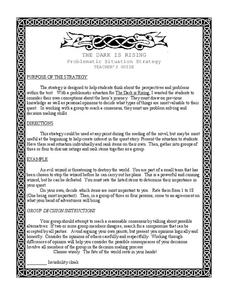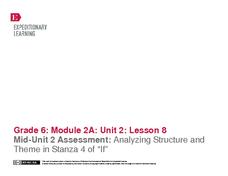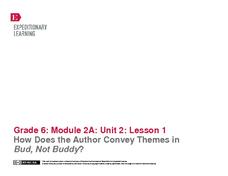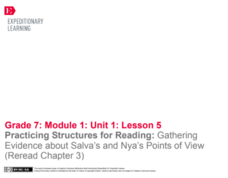Curated OER
Tangerine: Anticipation Guide
Encourage your readers to make predictions about Edward Bloor's young adult novel, Tangerine, with an anticipation guide that presents statements that introduce key issues in the novel.
Novelinks
The Dark Is Rising: Problematic Situation Strategy
What items would you need to save the world from an evil wizard? Prior to reading Susan Cooper's young adult contemporary fantasy The Dark is Rising, and to generate interest in the tale, class groups must reach consensus on a list of...
EngageNY
Launching Lyddie
Pupils engage in a close reading of chapter one of Katherine Paterson's novel, Lyddie. After answering text-dependent questions based on their reading, they complete reader's notes about how the setting, characters, and plot interact.
EngageNY
Planning the Introductory and Concluding Paragraphs of the End of Unit Assessment Essay
Preparation is the key to success! Using the guiding resource, scholars plan their end-of-unit analytical essays' introductory and concluding paragraphs based on their reading of Inside Out & Back Again. To prepare, they complete a...
EngageNY
Launching the Novel: Character Analysis of Ha
Scholars receive numbers as they work in groups to read Inside Out & Back Again. The instructor calls out specific numbers for readers to share the group's thoughts. Then, they use a model passage to demonstrate the effective actions...
EngageNY
Researching Part 2: Reading for Gist and Gathering Evidence Using the Researcher’s Notebook
The gist should be short and sweet! Pupils practice finding the gist of an informational text and then write a summary of the text. Next, they gather with their research teams to discuss a focus question based on the novel Bud, Not Buddy...
Novelinks
The Little Prince: Anticipation Guide
Begin your unit on Antoine de Saint-Exupéry's The Little Prince with an anticipation guide that addresses the novel's themes. Kids read ten statements that discuss love, friendship, and growing up, and determine whether or not they agree...
Curated OER
Leadership Qualities: Ender's Game
What are the important character traits of a good military leader? Individuals ponder this question before reading Orson Scott Card's science fiction novel, Ender's Game. After individuals rank a series of qualities, groups meet, compare...
Curated OER
The Little Prince: Socratic Questioning Strategy
Challenge readers to read closer in an activity based on the Socratic questioning strategy. As kids read Antoine de Saint Éxupery's The Little Prince, they use sentence starters to ask deeper questions about the text, and to relate what...
EngageNY
Analyzing Structure and Theme in Stanza 4 of “If”
Here is a lesson that provides scholars with two opportunities to stretch their compare-and-contrast muscles. First, learners compare and contrast their experience reading the fourth stanza of If by Rudyard Kipling to listening to the...
Novelinks
The Giver: Vocabulary Bingo!
Bingo! Combine the thrill of bingo with Lois Lowry's The Giver in a fun vocabulary lesson. Kids write selected vocabulary words from the novel onto a bingo chart, and then listen for the correct definitions in order to mark off their words.
EngageNY
Looking Closely at Stanza 3—Identifying Rules to Live By Communicated in “If”
Just as Bud, from the novel Bud, Not Buddy by Christopher Paul Curtis, had rules to live by, so does the poem, If by Rudyard Kipling, but how do the two relate? Pupils delve deep into the poem's third stanza, participate in a grand...
EngageNY
How Does the Author Convey Themes in Bud, Not Buddy?
After reading up to chapter 12 of Bud, Not Buddy by Christopher Paul Curtis, scholars read chapter 13 and take part in a grand conversation about the author's writing techniques. Pupils discuss how his writing conveyed literary themes...
EngageNY
Qualities of a Strong Literary Argument Essay
One activity, two essays, and one central theme: qualities of an argument essay. Here, scholars first describe the qualities of an argument essay regarding Bud's rules to live by from the novel Bud, Not Buddy by Christopher Paul Curtis....
Curated OER
The Adventures of Tom Sawyer: Before Reading Strategy
Spark interest in Mark Twain's The Adventures of Tom Sawyer with an anticipatory exercise that begins with a brainstorm around the words heroic and good boy. Pupils then complete an anticipation guide, discuss the results in groups, and...
Texas Center for Learning Disabilities
Chapter 6 Teacher Guide and Student Log
Following routines established in previous lessons in the unit, study teams make and verify predictions about what will occur in "The Band," Chapter 6 of Tony Johnston's Any Small Goodness: A Novel of the Barrio. In addition, class...
EngageNY
End of Unit 2 Assessment: Final Draft of Literary Argument Essay
Take the last step in writing a literary argument essay using Bud, Not Buddy by Christopher Paul Curtis in an activity focused on feedback. Using the stars and steps revision method, pupils consider teacher and peer feedback to revise...
EngageNY
Establishing Structures for Reading: Gathering Evidence about Salva’s and Nya’s Points of View (Reread Chapters 1 and 2)
Readers practice gathering textual evidence to support their understanding of character point of view in A Long Walk to Water by Linda Sue Park. Working with partners, they complete a Gathering Evidence graphic organizer and engage in...
EngageNY
Practicing Structures for Reading: Gathering Evidence about Salva’s and Nya’s Points of View (Reread Chapter 3)
How does an author develop and contrast character points of view in a work of literature? Using a graphic organizer, readers continue gathering evidence about character point of view from Linda Sue Park's A Long Walk to Water. Next,...
Curated OER
Speak: Questioning Strategy - ReQuest Strategy
The best way to analyze a piece of literature is to ask questions about the characters, plot, and theme. Encourage your learners to stump the teacher with the most difficult questions they can create using Bloom's Taxonomy and various...
Curated OER
The Physics of Flight
Three activities allow young flight engineers to understand the 4 principles of flight (weight, lift, thrust, and drag), to construct a glider, and to create a propeller. Multicultural history and literature are integrated by reading...
Penguin Books
Core Curriculum Lesson Plans for Jefferson's Sons
Thomas Jefferson lived a controversial life. A series of lesson plans shares information about Jefferson's Sons, a novel about the infamous founding father. Discussion questions and other tasks explore different points of view and cover...
Penguin Books
Core Curriculum Lesson Plans for The Lions of Little Rock
Schools in the 1950s and 60s looked very different from the schools we know today. An educator's guide explores the civil rights movement and, specifically, the process of integrating schools. Questions cover key themes in the novel and...
Carnegie Library
Creative Writing: Middle School Lesson Plan
Enhance a unit on historical fiction with an engaging writing lesson. Learners bring the Industrial Era to life as they compose their own historical fiction pieces based on primary source images of Pittsburgh steel workers.

























